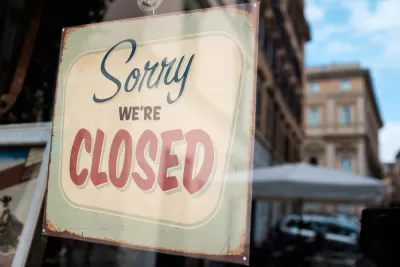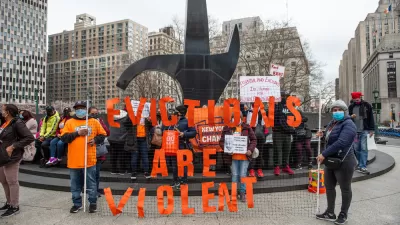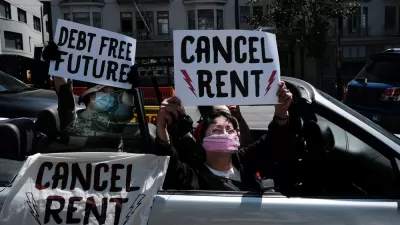A commercial district in a wealthy part of Washington, D.C. is shedding high-profile businesses. A reboot is in order, according to local business owners and political leaders.

A commercial district in the Friendship Heights neighborhood of Washington, D.C. serves as a case study of the economic challenges facing retailers during the pandemic, and the potential for a planning response.
Luz Lazo reports:
The economic crisis caused by the coronavirus pandemic has exacerbated the financial problems of retailers in the commercial district around the Friendship Heights Metro station, reigniting appeals for a major revival of what was once a corridor of high-end shopping.
With tenants large and small facing foreclosure, liquidation, or closures—about a dozen retailers and restaurants have closed in the neighborhood recently—local stakeholders are beginning to consider ideas for how to revitalize the area.
To be clear, the pandemic isn't the only headwind facing the commercial district. Newly opened competitors in nearby neighborhoods, with more of the amenities shoppers expect, have also hurt some of the businesses located in the area.
From these challenges, some residents and business leaders "say the exits present an opportunity for the area to reinvent itself," according to Lazo. Among the solutions proposed for the commercial area's struggles, reports Lazo, is a new sense of place.
“What Friendship Heights needs is not more stores selling $1,500-pairs of shoes or a $5,000-piece of expensive jewelry,” says Montgomery County Council member Andrew Friedson in the article. “It needs nice local places to grab a cup of coffee, to have a nice meal, to pick up some groceries and enjoy an evening out.”
The District’s new Comprehensive Plan also offers a prescription for the area, calling for "more density in the commercial corridor, with multiuse redevelopment on top of the Metro."
"The area also lacks a singular entity such as a Business Improvement District to promote and lead in hard times," according to Lazo.
The feature-length article includes a lot more detail about the current economic and land use conditions of the area and explores in much more detail the potential of ideas for revitalization offered in the article.

Alabama: Trump Terminates Settlements for Black Communities Harmed By Raw Sewage
Trump deemed the landmark civil rights agreement “illegal DEI and environmental justice policy.”

Study: Maui’s Plan to Convert Vacation Rentals to Long-Term Housing Could Cause Nearly $1 Billion Economic Loss
The plan would reduce visitor accommodation by 25% resulting in 1,900 jobs lost.

Planetizen Federal Action Tracker
A weekly monitor of how Trump’s orders and actions are impacting planners and planning in America.

Wind Energy on the Rise Despite Federal Policy Reversal
The Trump administration is revoking federal support for renewable energy, but demand for new projects continues unabated.

Passengers Flock to Caltrain After Electrification
The new electric trains are running faster and more reliably, leading to strong ridership growth on the Bay Area rail system.

Texas Churches Rally Behind ‘Yes in God’s Back Yard’ Legislation
Religious leaders want the state to reduce zoning regulations to streamline leasing church-owned land to housing developers.
Urban Design for Planners 1: Software Tools
This six-course series explores essential urban design concepts using open source software and equips planners with the tools they need to participate fully in the urban design process.
Planning for Universal Design
Learn the tools for implementing Universal Design in planning regulations.
Caltrans
Smith Gee Studio
Institute for Housing and Urban Development Studies (IHS)
City of Grandview
Harvard GSD Executive Education
Toledo-Lucas County Plan Commissions
Salt Lake City
NYU Wagner Graduate School of Public Service





























